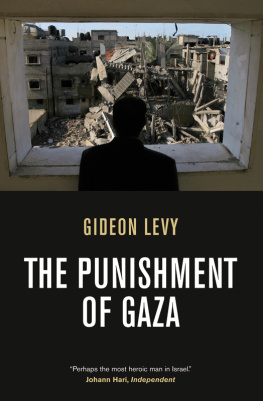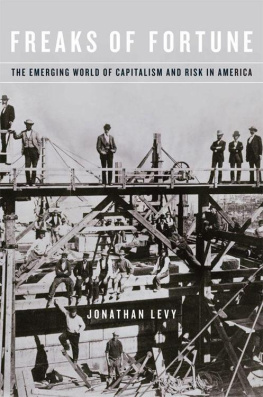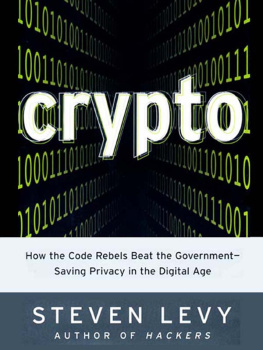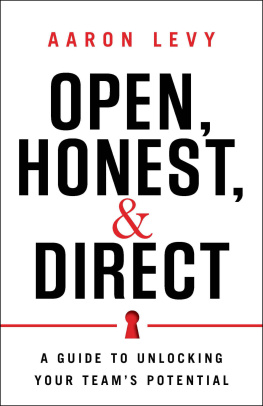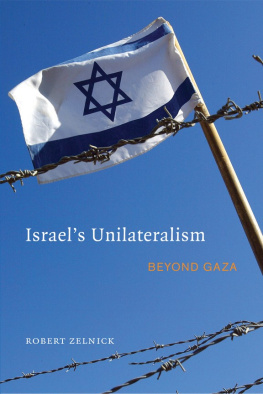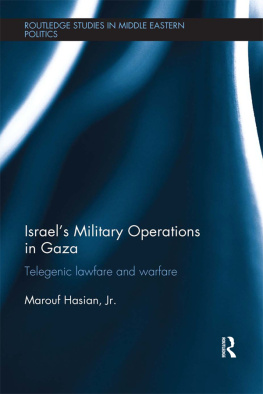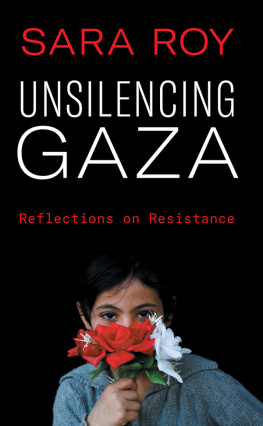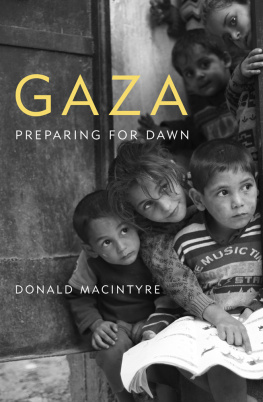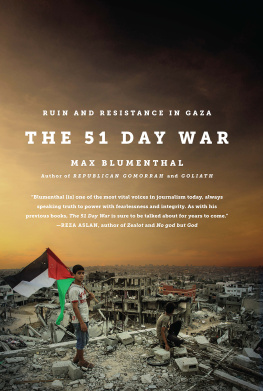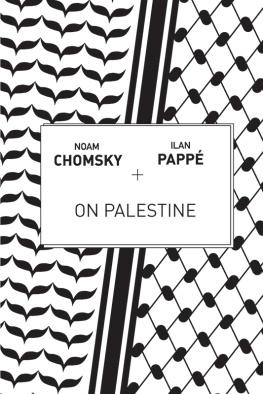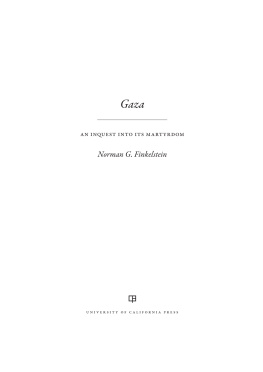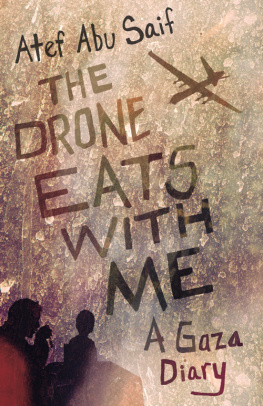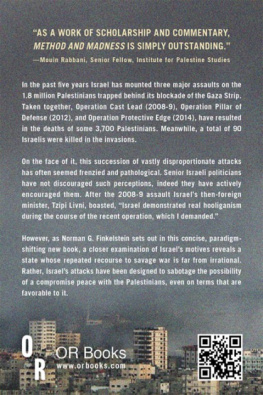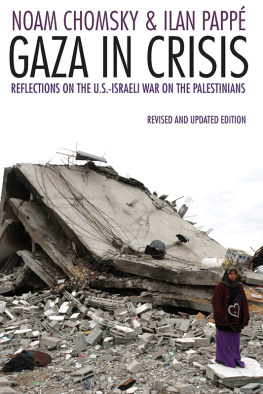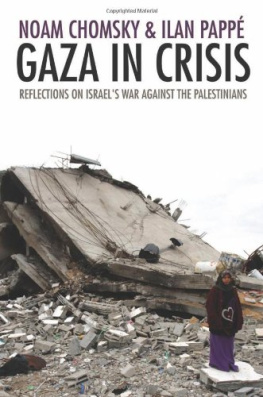THE PUNISHMENT OF GAZA
Described by Le Monde as a thorn in Israels flank, Gideon Levy is a prominent, award-winning Israeli journalist. For over twenty years he has covered the Israel-Palestine conflict, in particular the occupation of Gaza and the West Bank, for the Israeli newspaper Haaretz in his column Twilight Zone.
Israels 2009 invasion of Gaza was an act of aggression that killed over a thousand Palestinians and devastated the infrastructure of an already impoverished enclave. The Punishment of Gaza shows how the ground was prepared for the assault and documents its continuing effects.
From 2005the year of Gazas liberationthrough to 2009, Levy tracks the development of Israeli policy, which has abandoned the pretense of diplomacy in favor of raw military power, the ultimate aim of which is to deny Palestinians any chance to form an independent state. Punished by Israel and the Quartet of international powers for the democratic election of Hamas, Gaza has been transformed into the worlds largest open-air prison. From Gazan families struggling to cope with the random violence of Israels blockade and its targeted assassinations, to the machinations of legal experts and the continued connivance of the international community, every aspect of this ongoing tragedy is eloquently recorded and forensically analyzed. Levys powerful journalism shows how the brutality at the heart of Israels occupation of Palestine has found its most complete expression to date in the collective punishment of Gazas residents.
First published by Verso 2010
Gideon Levy
Translation of Introduction Revital Sella
All rights reserved
The moral rights of the author have been asserted
1 3 5 7 9 10 8 6 4 2
Verso
UK: 6 Meard Street, London W1F 0EG
US: 20 Jay Street, Suite 1010, Brooklyn, NY 11201
www.versobooks.com
Verso is the imprint of New Left Books
ISBN-13: 978-1-84467-601-9
British Library Cataloguing in Publication Data
A catalogue record for this book is available from the British Library
Library of Congress Cataloging-in-Publication Data
A catalog record for this book is available from the Library of Congress
Typeset in Bembo by Hewer Text UK Ltd, Edinburgh
Printed in the US by Maple Vail
Contents
It was a theatrical moment if ever there was one. It happened a long time ago, sometime in the 1990s, after many years of going to Gazawhere I worked and which I love. We stood there, the three of usPalestinian human rights activist Bassem Eid, my brilliant and steady cameraman Miki Kratsman and myself on the way out of the Erez checkpoint, which controlled entry and exit from the Strip then as it does now. Those were the euphoric Oslo days, and we (How foolish? How credulous?) thought it was all over, that the occupation had ended, that Gaza was free, liberated. We wouldnt be going there anymore, at least not in the capacity of Sisyphus, as we had done for so many years, to cover the Israeli occupation for an Israeli public that does not want to read, see or hear anything about Gaza. In one rare and unforgettable moment we turned, all three as one, and in a gesture straight out of the movies waved Gaza farewell. Goodbye occupied Gaza, farewell! We are never to meet again, at least not in your occupied state. We shant be coming to you any more to write up your trials and tribulations, the futile bloodshed and destruction, the humiliation, destitution, deprivation and bereavement that have been your lot for years. Gaza is on a new road, we thought, as we made for Tel Aviv, the most distant point from where we were in the universe, where never a thought is given to Gaza, where its fate never stirs a soul.
Our gesture was misconceived. Very soon we did return to Gaza, to the daily tales of life and death. The occupation did not end. On the contrary, it is more cruel, criminal and inhuman today than ever before. Ten years later, in 2005, when Israel disengaged from Gaza, we were much wiser: this time we knew that the occupation had simply changed form. The jailer pulled out of the jail and was now holding its prisoners captive from without. Yes, Gaza was and still is the largest prison on earth, a gruesome experiment performed on living human beings.
Gaza, my beloved. Ive always cherished going there, a statement that to most Israelis sounds lunatic. Since that dramatic wave of farewell, Ive been back to Gaza dozens of times. On one occasion a reporter from French televisions TF1 channel joined us. In a doorway in Rafah (or was it Khan Younis?) where a paralyzed Palestinian mother lost her only child to an Israeli missile, I said to this French colleague, This is when Im ashamed to be Israeli. This horrible missile was launched in my name too. The next day he called me: We wont be able to broadcast your last remark. It is too extreme. Our audience may take offense. I was deeply distressed. That is precisely what I have been trying to elicit all these years: outrage, outrage and offense at what Israel is making a million and a half helpless immiserated people living in the Strip endure. To the best of my meager abilities, I am asking all Israelis to be outragedor at least to understand what is being perpetrated in their name, so that they may never have the right to claim: We did not know. We didnt know that the Israeli occupation was so devastating, so brutal; we didnt know this horror was going on.
November 2006 was the last time we were in Gaza. We went to the Indira Gandhi Kindergarten, a private establishment run by a teacher named after the Indian Stateswoman. We arrived during the burial of Najawa Khalif, a twenty-year-old kindergarten teacher killed by another Israeli missile. The school bus had been hit when ferrying the children to this beautifully tended nursery school. Khalif was killed in front of twenty of her wards. On the day we came they were drawing pictures of her lying bleeding on the road, the children huddling terrified beside her, with an Israeli tank shelling from a distance and a plane dropping bombs from above. That is the bloody childhood recollection of the Indira Gandhi Kindergarten kids, and it is my last memory of Gaza. I was no longer allowed to go there. In November 2006 Israel shut down all communication with the Gaza Strip. Israeli journalists have been denied access ever since.
With a broken heart and eyes overflowing I have watched the last war from afar. Operation Cast Lead Israel called it. It was a war that was no war, in which Israel met virtually no resistance, no counterattack worth speaking of. It was just a wild onslaught upon the most helpless population in the world, besieged and jailed, with nowhere to run, not even into the sea. White phosphorous shells scorching living flesh, Flechettes flinging their nails far and wide, manned and unmanned aircraft discharging missiles, disproportionate bombing and shelling. Hundreds of innocents were killed for no other reason other than they were Gazans. The people of Gaza, many of them born to 1948s refugees, who had already suffered one tragedy by Israels hand, now faced the next chapter in the tragic saga of their lives: an aimless, futile, criminal, superfluous offensive.
I spoke on the phone with my friends there and felt my heart give way. Over 1,300 dead, more than a hundred times the number of Israeli casualties, a horrific ratio rarely paralleled. Over 5,000 wounded, 2,400 buildings destroyedamong them 30 mosques, 121 factories and workshops, and 29 institutions of education. The houses of 350,000 residents were damaged, some beyond recognition. The numbers fail to convey the true dimensions of the horror. And above all there was the new IDF doctrine: a minimum of casualties on our side irrespective of the price. Virtually everything is now fair play.

